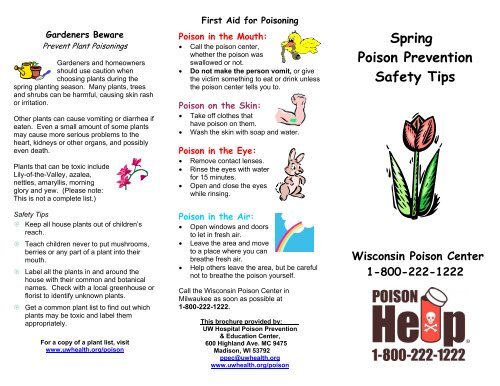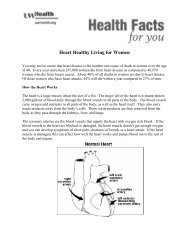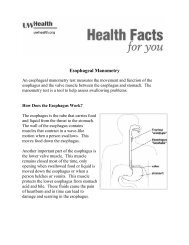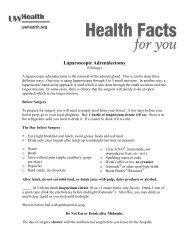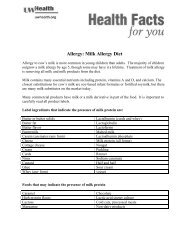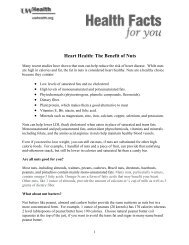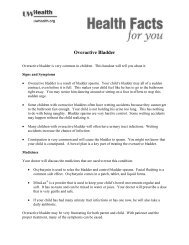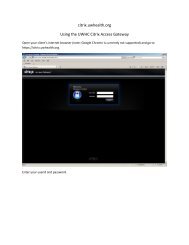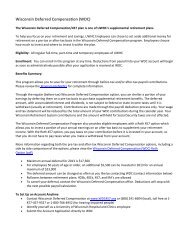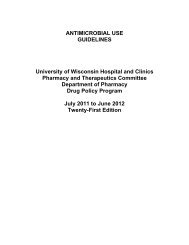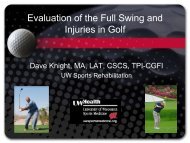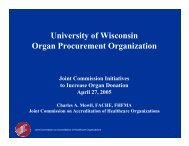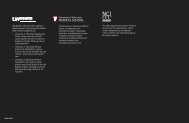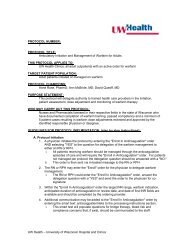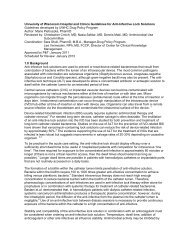Spring Poison Prevention Safety Tips (pdf) - UW Health
Spring Poison Prevention Safety Tips (pdf) - UW Health
Spring Poison Prevention Safety Tips (pdf) - UW Health
- No tags were found...
You also want an ePaper? Increase the reach of your titles
YUMPU automatically turns print PDFs into web optimized ePapers that Google loves.
Gardeners BewarePrevent Plant <strong>Poison</strong>ingsGardeners and homeownersshould use caution whenchoosing plants during thespring planting season. Many plants, treesand shrubs can be harmful, causing skin rashor irritation.Other plants can cause vomiting or diarrhea ifeaten. Even a small amount of some plantsmay cause more serious problems to theheart, kidneys or other organs, and possiblyeven death.Plants that can be toxic includeLily-of-the-Valley, azalea,nettles, amaryllis, morningglory and yew. (Please note:This is not a complete list.)<strong>Safety</strong> <strong>Tips</strong> Keep all house plants out of children’sreach. Teach children never to put mushrooms,berries or any part of a plant into theirmouth. Label all the plants in and around thehouse with their common and botanicalnames. Check with a local greenhouse orflorist to identify unknown plants. Get a common plant list to find out whichplants may be toxic and label themappropriately.For a copy of a plant list, visitwww.uwhealth.org/poisonFirst Aid for <strong>Poison</strong>ing<strong>Poison</strong> in the Mouth:• Call the poison center,whether the poison wasswallowed or not.• Do not make the person vomit, or givethe victim something to eat or drink unlessthe poison center tells you to.<strong>Poison</strong> on the Skin:• Take off clothes thathave poison on them.• Wash the skin with soap and water.<strong>Poison</strong> in the Eye:• Remove contact lenses.• Rinse the eyes with waterfor 15 minutes.• Open and close the eyeswhile rinsing.<strong>Poison</strong> in the Air:• Open windows and doorsto let in fresh air.• Leave the area and moveto a place where you canbreathe fresh air.• Help others leave the area, but be carefulnot to breathe the poison yourself.Call the Wisconsin <strong>Poison</strong> Center inMilwaukee as soon as possible at1-800-222-1222.This brochure provided by:<strong>UW</strong> Hospital <strong>Poison</strong> <strong>Prevention</strong>& Education Center,600 Highland Ave. MC 9475Madison, WI 53792ppec@uwhealth.orgwww.uwhealth.org/poison<strong>Spring</strong><strong>Poison</strong> <strong>Prevention</strong><strong>Safety</strong> <strong>Tips</strong>Wisconsin <strong>Poison</strong> Center1-800-222-1222
Treat Allergies SafelyAvoid Medication MisuseMany people suffer from seasonal allergies.During spring, when pollen and mold begin tofill the air and cause allergic reactions, peopleuse medicines to help control allergies moreoften. These products, called antihistamines,may result in potentially harmful effects ifmisused.Common side effects associated withantihistamines include:• Dizziness • Drowsiness• Dry mouth • Dilated pupils• A racing heartAn overdose may cause seizures, heart beatirregularities, and hallucinations.<strong>Safety</strong> <strong>Tips</strong>• Read the label every time,and follow the directions.• Always use the measuring devicethat comes with the medicine.• Do not take or give medicine in the dark,or when sleepy.• Never take someone else’s prescribedmedicine.• Speak with your physician for moreinformation about seasonal allergies.Use Care When <strong>Spring</strong> CleaningSpend a few minutes tosafeguard against potentialpoisoning hazards in yourhome.Cleaning ProductsProducts such as bleach, disinfectants,floor and tile cleaners, automatic dishwasherdetergent and glass cleaners can be toxic.<strong>Safety</strong> <strong>Tips</strong>• Store cleaning products uphigh and out of children’sreach.• Keep all cleaning productsin their original containerswith original labels.• Always read the product label first and usethe product according to the directions.• Never leave a cleaning product open andunattended.Mixing ChemicalsMixing certain cleaning chemicals can createtoxic gases. Breathing in these fumes cancause coughing, burning of the eyes, noseand throat, and difficulty breathing.<strong>Safety</strong> <strong>Tips</strong>• Do not mix cleaning products.• Work in well-ventilated areas when usingcleaning products.Product DisposalEmptying householdchemicals into drainsor throwing them outwith the regular trashcan pollute the environment. The poisoncenter can suggest ways to help you disposeof these products safely.<strong>Safety</strong> Tip• Dispose of cleaning products according tothe instructions on the label.Lawn Care and Pesticide <strong>Safety</strong>Fertilizers can irritate the skin and stomach.After using fertilizer, make sure everyonestays off the lawn for two days or until it rains.Pesticides are alsodangerous poisoning hazards,and are likely to be moretoxic than lawn fertilizers.<strong>Safety</strong> <strong>Tips</strong>• Wear protective clothing(gloves, glasses, long sleeves, and pants).• Do not apply on a windy day.• Keep children and pets away duringapplication and until the product dries, oras directed on the label.• Always store lawn chemicals in the originalcontainer, complete with labels that listingredients, directions for use and first-aidsteps in case of an accidental poisoning.© Illinois <strong>Poison</strong> Center


